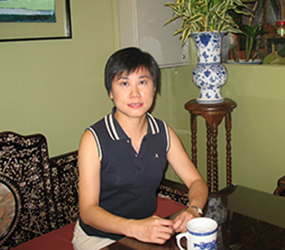Venia Mak, Access Services Sub-Librarian at Hong Kong University of Science and Technology
09 Jan 2016 by iopp
What do you think will be your biggest challenges over the next five years?
Even though it is important for academic librarians to redefine ways to support research and make themselves involved in research processes, it is not easy to be trusted by faculty to let librarians engage with their research processes as traditionally, librarians rely mostly on commercial textual collections and some of us may not be familiar with data management. Therefore, it’s time to equip ourselves to meet the new role, e.g. know best practice in data curation/data standards, know about data visualization tools, assist researchers in preparing data management plans, require reuse rights from publishers and protect legitimate interest when making data/research outputs open.
What is the biggest challenge you have faced in your career so far?
Evolving technology and ever-changing business models for electronic resources are the constant challenges for collection management that stimulate me to learn faster and respond quicker.
What does the library of the future look like?
The library will be a place for connecting people for knowledge creation.
How can librarians encourage students to visit the library?
Our resources are rich but attention from our students is scarce. Librarians can organise more engaging and activity-based events and let students explore library services and resources throughout the process.
How are social media and the growth of online communications changing the way you interact with your colleagues and library patrons?
Apart from sending emails and posting notices on the library web pages, we also disseminate information via blogs and Facebook and post our e-learning objects in YouTube. Our users have also started using WhatsApp for contacting librarians. We are pleased to know that the number of WhatsApp messages received is close to the number of emails collected for enquiries.
What useful online resources/blogs/forums would you recommend to fellow librarians?
LIBLICENSE-L is a forum for licensing issues and related concerns about scholarly communication which facilitate discussion and keep librarians alert with the issues raised. It is also interesting to read the daily newsletter Social Media Today for pursuing a thorough understanding of social media development.
What piece of advice would you pass on to new colleagues just starting their librarianship?
Be flexible and open-minded as you will be engaging in an ever-changing environment. It is also imperative for academic librarians to be involved in research processes and manage data for faculty and students.
In your opinion, what is the best thing about being a librarian?
Satisfying users’ information needs and participating in their learning and research processes make my career fruitful and rewarding.
========================
Ms. Venia Mak joined the Hong Kong University of Science and Technology Library in November 2012. She is the Sub-Librarian in charge of Access Services of the Library. Her portfolio includes the leadership and management of the Library, circulation services, document delivery services, media services and scholarly communication services. In addition, Ms. Mak participates in the overall management of the Library as a member of the Library’s senior management committee, and also represents the Library in external committees. Her prior engagement was the Senior Assistant Librarian of the Hong Kong Institute of Education Library with responsibilities for the management and development of Library systems and online services, electronic resources acquisitions & management and the Library’s in-house digital products and services. Ms. Mak obtained 15 years of experience in electronic resources acquisitions and management. She was instrumental in negotiating licences for electronic databases, serials and books, and enabled the Library to generate considerable cost savings and provide a wider range of resources through participation in local consortial acquisitions programmes with JULAC in Hong Kong, as well as through inter-regional consortia.